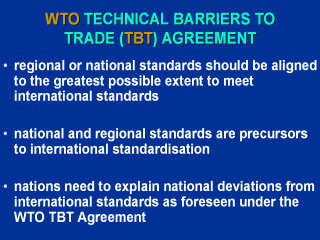| front |1 |2 |3 |4 |5 |6 |7 |8 |9 |10 |11 |12 |13 |14 |15 |16 |17 |18 |19 |20 |21 |22 |23 |24 |25 |26 |27 |28 |29 |30 |31 |32 |33 |34 |35 |36 |37 |38 |39 |40 |41 |42 |43 |44 |45 |46 |47 |48 |49 |50 |51 |52 |53| 54 |55 |56 |57 |review |
 |
This principle is commonly
promoted by enterprises operating at a global scale, but it offers also
benefits for small and medium sized enterprises. It seeks to reduce the
costs a manufacturer of a product has to face for goods being re-designed
and re-tested when entering foreign markets. Such a principle is beneficial for consumers provided that the one applied standard takes their interests into account and/or meets legal requirements concerning legitimate regulatory objectives such as the protection of human health and the environment. Consequently, such standards ought to respect some basic requirements. - If standards bodies were to produce simultaneously international and regional or national standards, some partiality, incoherence and conflict in the set of international standards could arise. Such a situation would be confusing for businesses, users and public authorities, and the latter would risk creating regulatory barriers if using conflicting international standards as a basis for technical regulation. - To this end, WTO members adopted a set of principles to clarify and strengthen the concept of international standards under the TBT Agreement (6). The WTO accepted principles are: All essential information regarding work planning, work under progress and final results should be made easily accessible to all interested parties and throughout all stages of standards development. Appropriate time and opportunities for written comments should be provided. Any interested national member should be provided with meaningful opportunities to participate in standards development. The standards development process should be conducted in a non-discriminatory way and should not give privilege to, or favour the interests of, a particular supplier or country. Conflicting arguments must be reconciled to satisfy all national members. The international standards development process should take account of market needs, scientific and technological development. It should also consider regulatory needs and pay due respect to consumer concerns, and concerns relating to the health and safety of workers and the protection of the environment. The standards development process should result in a coherent set of international standards that do not conflict with each other. International standards bodies should co-operate and co-ordinate with each other to avoid conflicting international standards. International standardisation should take the constraints on developing countries to effectively participate in standards development into consideration. Provisions for capacity building and technical assistance within international standards bodies should also be considered. WTO/G/TBT/9 of 10 November 2000, and Annex 4 thereof. THE EUROPEAN PRINCIPLES OF GOOD GOVERNANCE IN INTERNATIONAL STANDARDISATION BODIES Within the WTO, there are a number of international standardisation organisations which produce "international standards" within the meaning of the TBT agreement, e.g. the International Maritime Organisation, or the framework of agreements and conventions for international road, rail, inland waterway, and combined transport. These "standards" are developed exclusively amongst Government representatives without direct participation of individual stakeholders to whom they are targeted. There is a potential to enhance the application of European principles of good governance and accountability. The Commission will seek to find opportunities to render the procedures and structures under which these standards are developed more open and transparent. - THE GLOBAL DIMENSION OF STANDARDISATION Global trade continues to increase. The use of international standards can enhance market access and facilitate trade. |